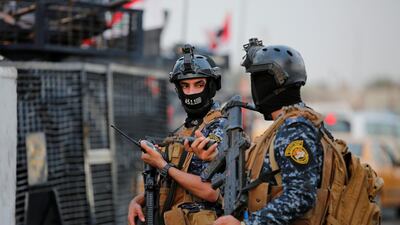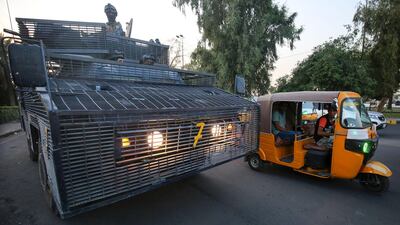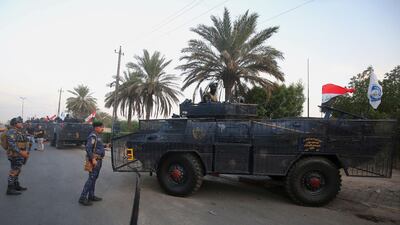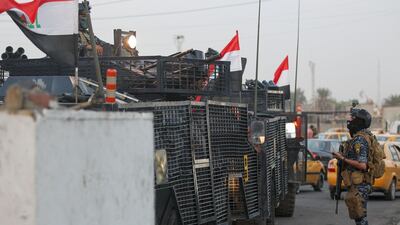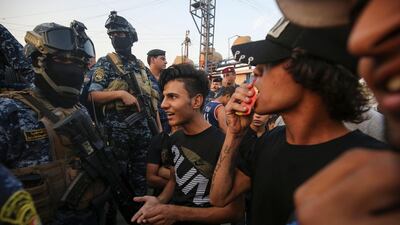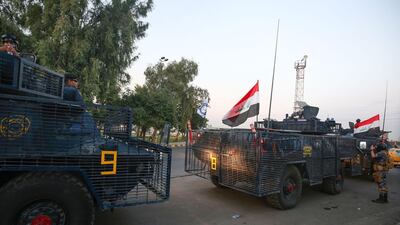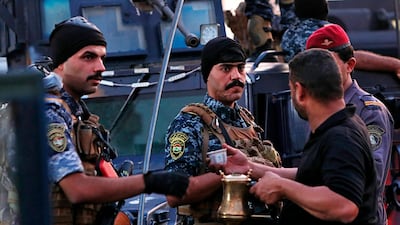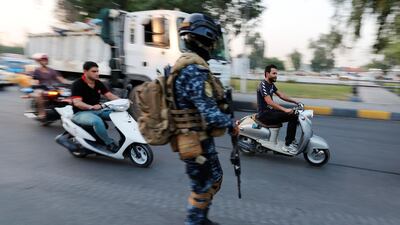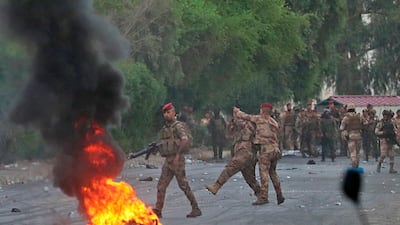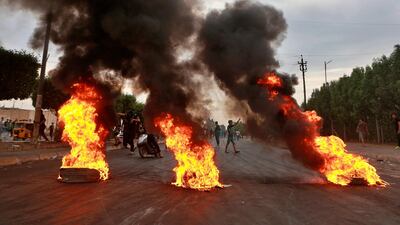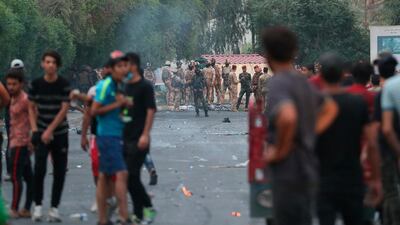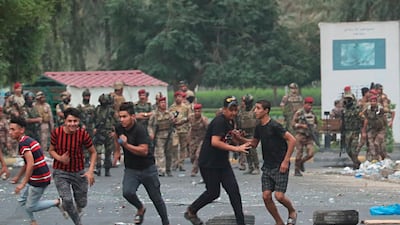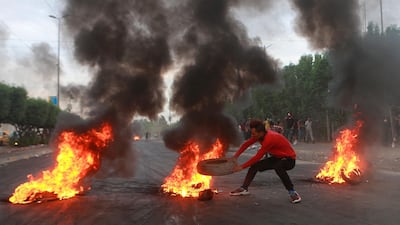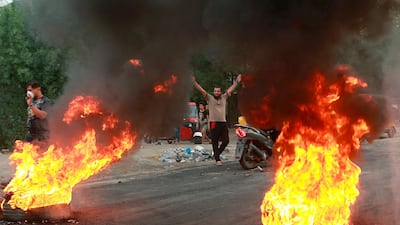Iraqi President Barham Salih called for dialogue and a halt to the violence after a week of riots that left about 100 dead, with the military admitting to using "excessive force."
Demonstrations have rocked the capital and Iraq's southern provinces as protesters, who first demanded reforms to fight corruption and unemployment, called for a total overhaul of the country's political system.
In a televised address on Monday evening, Mr Salih proposed a "national, all-encompassing and frank dialogue … without foreign interference" to chart a way out of the crisis.
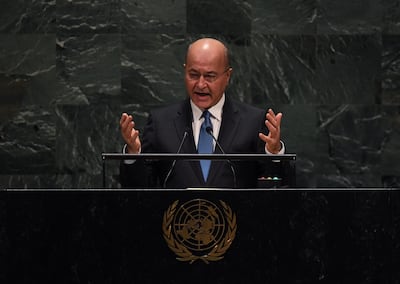
"There is no legitimacy to any political process or system that does not work to achieve your demands," Mr Salih told protesters.
The demonstrations are unprecedented in Iraq because of their apparent spontaneity and independence in a deeply politicised society.
But they have also been exceptionally deadly with more than 100 people killed and 6,000 wounded since Tuesday.
Witnesses have documented how security forces used tear gas and live rounds while authorities accused "unidentified snipers" of shooting at protesters and the police.
Mr Salih said those who attacked demonstrators and security forces were "enemies of the people" and denounced weekend raids on local and regional media stations.
Iraq's parliament voted to freeze all provincial and municipality councils on Tuesday during its first session after the protests erupted.
The session followed a failed attempt to convene on Saturday, when parliament's largest bloc, including the 54 MPs led by populist cleric Moqtada Al Sadr, boycotted the session.
More than 200 parliamentarians arrived for Tuesday's extraordinary session called by speaker Mohammed Al Halbusi, defying expectations that they would not meet quorum.
Prime Minister Abdel Mahdi held marathon meetings with Mr Al Halbusi, the cabinet, tribal chiefs, and the country's top justice over the demonstrations, with his office issuing statements saying that life had "returned to normal" after a week of bloody demonstrations.
The spree of attacks and threats against media outlets in Iraq has alarmed the United Nations, journalists and monitors, who demanded that the government prevent the "silencing" of journalists covering the mass protests.
On Saturday evening, the Baghdad bureaus of Kurdistan-based NRT TV, Saudi-owned Al-Arabiya and the local Al-Dijla channel were raided by masked men, the stations said.
Security camera footage aired by Al-Arabiya showed around a dozen men in tactical gear and helmets entering the bureau, ripping screens off walls and rummaging through drawers.
Al-Arabiya said it had received "assurances" from Prime Minister Adel Abdul Mahdi's office that the incident would be investigated.
The UN's top official in Iraq, Jeanine Hennis-Plasschaert, said she was "shocked at the vandalism [and] intimidation".
The president's speech came hours after Iraq's military admitted to using "excessive force outside the rules of engagement" against protesters in the east Baghdad district of Sadr City.
An overnight rally there deteriorated into clashes that left 13 people dead, medics and security sources said.
In videos distributed on social media, protesters could be seen ducking into streets littered with burning tyres as volleys of gunfire and suspected heavy weapons were heard.
But by Monday evening, in line with government orders, the military had been pulled out of Sadr City and a few police officers could be seen on the edges of the neighbourhood.
Monday's statement was the first time security forces acknowledged using disproportionate measures.
The International Committee of the Red Cross on Monday called on authorities to allow Iraqi health workers to treat the wounded safely.
"The alternative is unthinkable for a population already weary and in need," said Katharina Ritz, ICRC's head of delegation in Iraq.
Sadr City, a densely populated, impoverished part of the capital, is a bastion of firebrand cleric Moqtada Al Sadr who has thrown his weight behind the protests by calling on Mr Abdul Mahdi's government to resign.
But the embattled prime minister instead announced a series of reforms to create jobs, boost social welfare and oust corrupt officials.
He has accused "saboteurs" of infiltrating the protests, a claim echoed by the Hashed Al Shaabi, a powerful network of mostly-Shiite, pro-Iran paramilitary units mostly opposed to the United States.
"We know who stands behind these protests. The plan to bring down the regime has failed," its chief Faleh Al Fayyadh told journalists in Baghdad.
He said his forces would support actions against corrupt institutions but not "the fall of the regime", a chant which has featured more prominently in the protests in recent days.
"Those who wanted to defame Iraq will be punished," Mr Fayyadh said. He said that his forces were "ready for any government order".
His words echoed a statement earlier Monday by Iran's supreme leader Ayatollah Ali Khamenei, who accused "enemies" of trying to drive a wedge between Tehran and Baghdad.
"Enemies seek to sow discord but they've failed & their conspiracy won't be effective," Mr Khamenei said on his office's Twitter account.
Iran urged its citizens planning to take part in a major Shiite pilgrimage in Iraq to delay their travel into the country because of the violence.
Baghdad, a close ally of Washington, has close but complicated ties with Tehran, which enjoys significant influence among its Shiite political groups.
On Monday, Mr Abdul Mahdi said he discussed the recent events and reform plans in a phone call with US Secretary of State Mike Pompeo, without providing further details.
He also met visiting Russian Foreign Minister Sergey Lavrov on Monday.
US media reported on a leaked email on Monday from US Ambassador to Iraq Matthew Tueller to US military leaders at the weekend saying it "appears inevitable" that Mr Abdul Mahdi would resign imminently.
